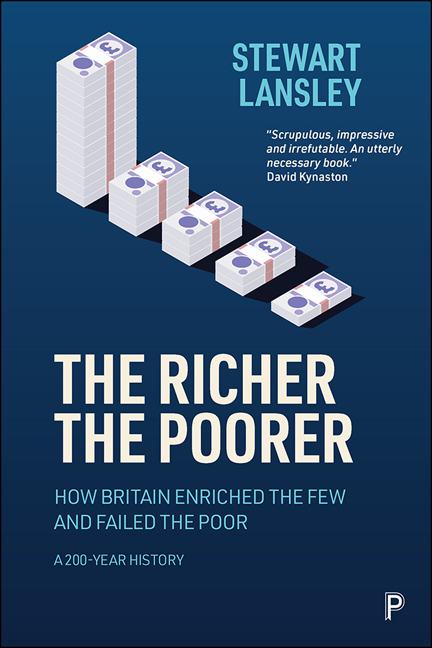Book contents
- Frontmatter
- Miscellaneous Frontmatter
- Dedication
- Epigraph
- Contents
- List of figures
- Preface and acknowledgements
- Introduction: Knighthoods for the rich, penalties for the poor
- PART I 1800–1939
- PART II 1940–59
- PART III 1960–79
- PART IV 1980–96
- PART V 1997–2010
- PART VI 2011–20
- Afterword: COVID-19 and ‘the polo season’
- Notes
- Index
13 - Don’t mention the ‘p’ word
Published online by Cambridge University Press: 13 May 2022
- Frontmatter
- Miscellaneous Frontmatter
- Dedication
- Epigraph
- Contents
- List of figures
- Preface and acknowledgements
- Introduction: Knighthoods for the rich, penalties for the poor
- PART I 1800–1939
- PART II 1940–59
- PART III 1960–79
- PART IV 1980–96
- PART V 1997–2010
- PART VI 2011–20
- Afterword: COVID-19 and ‘the polo season’
- Notes
- Index
Summary
Despite their political differences, post-war governments of all colours had taken the question of poverty seriously. Living standards for most moved broadly in line with wider improvements in prosperity. That was about to change. The politics of sharing was to be slowly replaced by the priorities of the market. Judging that rising poverty could be tolerated with little political price, Mrs Thatcher set very different priorities. Under her watch, officials were banned from using the word ‘poverty’.
This is what we believe
When Mrs Thatcher became Conservative Party leader, she was far from a fully signed-up member of her own fan club. On winning the leadership, the right-of-centre columnist Peregrine Worsthorne had advised her to get a better understanding of the Labour Party by reading Tawney. Thatcher was disillusioned with a politics of consensus, but it was not until she fell under the spell of pro-market thinkers, none more so than Friedrich von Hayek, that she began to develop a distinctive ideology. Hayek was the philosopher king of the right and a name she loved to drop. During speeches she would sometimes wave well-worn copies of his works, declaring: ‘This is what we believe.’
Another key source of influence was Keith Joseph. After the 1974 election defeats, he renounced his high-spending ministerial days. ‘I am steeping myself in Hayek’, he wrote to Ralph Harris, director of the Institute of Economic Affairs. He established his own think tank to promote the guru's ideas and the case for laissez-faire. He considered calling it the Erhard Foundation, after Germany's former chancellor Ludwig Erhard, but ended up with the somewhat bland Centre for Policy Studies. In April 1975, he presented a paper to the shadow cabinet, which firmly rejected ‘the path of consensus’.
Mrs Thatcher moved towards an individualist philosophy of market liberalism in steps. Only free markets, low taxes and personal wealth accumulation, she began to argue, would deliver a more entrepreneurial and prosperous society. Among those sending congratulations on her becoming prime minister were Milton Friedman –‘Britain can lead us to a rebirth of freedom –as it led us all down the road to socialism’ –and Hayek –‘Thank you for the best present on my 80th birthday anyone could have given me.’ Mrs Thatcher was not alone in her crusade.
- Type
- Chapter
- Information
- The Richer, the PoorerHow Britain Enriched the Few and Failed the Poor: A 200-Year History, pp. 115 - 123Publisher: Bristol University PressPrint publication year: 2021



